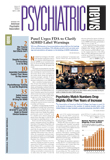The Medicare Part D program could save up to $800 million in the first 10 years if basic changes were enacted by Congress, according to a nationwide campaign whose goal is to overhaul the program.
The Americans United Coalition launched a campaign in March to get the prescription drug program modified.
Coalition members said changes are needed to provide huge savings to a benefit that threatens to balloon quickly in cost. A report by the Institute for America's Future concluded that Medicare Part D may provide very limited benefits to millions of beneficiaries because their prescription drug costs will remain unchanged or increase. They blamed the program's design for transferring costs from drug companies to the government.
Their cost projections are based on a Congressional Budget Office (CBO) estimate that marketing costs and insurance industry profits would add $38 billion to Part D's cost in the first eight years of the program.
The report also identified $4.8 billion in “wasted administrative costs” under Part D. The biggest source of waste in Part D is“ excess payments” for the medications beyond what Medicare would pay if Medicare Part D allowed for negotiated prices.
The report also used a comparison of drug prices paid by the Australian government for its version of a federal prescription subsidy to identify an extra $50 billion to $140 billion the U.S. government will pay for drugs annually through 2015. The total savings from a program that could negotiate the same schedule of prices as Australia, which is currently the country with the lowest drug costs, over the first eight years of the drug benefit would be almost $560 billion.
“We're paying an awful lot for the Bush administration's decision to go with the plan as they have designed it,” said Dean Baker, Ph.D., the report's author. “We have saddled the government with a large liability that will haunt us for years to come.”
Drugs Cost Much More in U.S.
The advocates for reforming the program said price negotiation would follow the practice of much of the industrialized world, which regularly imposes constraints on drug prices. This allows people in other countries to pay much lower prices than those in the United States.
Another CBO study assessed drug prices in several wealthy countries and found consumers in those countries paid on average between 35 percent and 55 percent less than consumers in the United States. Discounts obtained by the Department of Veterans Affairs, which does negotiate drug prices, were even larger.
The effort to modify Part D, which includes local lobbying in 22 states and the District of Columbia, will focus on prohibiting the removal of drugs from the preapproved list when participants switch between plans and a requirement for drug-price negotiation.
The reform advocates said the program's main failing is that it prohibits Medicare from negotiating with drug companies for lower prices.
Flaws in the program will also result in denied coverage to millions of seniors who will still pay monthly premiums this fall, said Roger Hickey, co-founder of the Institute for America's Future.
Allowing seniors to choose their drug plan directly from Medicare—instead of from a private insurance company—would give seniors a better drug plan, with lower costs and less confusion.
Diane Archer, the founder of the Medicare Rights Center, the largest independent source of health care information and assistance for Medicare recipients, said thousands have called its hotline because of difficulties accessing benefits and paying for their medications.
Advocates Say Eliminate Deadline
“The plan is something seniors are struggling with every day,” he said.
She and others urged the Bush administration to delay the May 15 deadline for seniors to sign up for a drug plan without being charged a penalty. However, in a mid-March speech, Bush said he would not support a delay.
Centers for Medicare and Medicaid Services Administrator Mark McClellan, M.D., Ph.D., acknowledged in recent comments during an APA-sponsored event on Capitol Hill that “the transition has not been without problems.” However, he said, the program has provided millions of beneficiaries who have mental illness with more comprehensive coverage. It also provides uniform benefits across the United States in place of Medicaid drug benefits that varied from state to state.
Guy Molyneux, a pollster, said public opinion data show that just one-third of voters have a favorable view of the drug program so far. Forty-three percent have an unfavorable view.
Congressional candidates may benefit from promises of major changes in Part D in order to reduce confusion and make drugs affordable, he said.
Democrats have made the controversial drug benefit a campaign issue. Rep. Henry. Waxman (D-Calif.) said the Republican-authored program is geared toward special interests, and its implementation was fumbled. Republicans accused critics of Part D of trying to scare seniors into not signing up for the plan.
“Medicare part D is working. Seniors are signing up for a drug benefit through Medicare for the very first time,” said Rep. Shelley Moore Capito (R-W.Va.), who cited studies that seniors could save as much as $1,100 annually through the program.
Supporters of the program said the best measure of its success is the extent of its use by the public. In late March the Department of Health and Human Services announced that 7.2 million beneficiaries had signed up for the drug plan. Overall, about 27 million seniors are enrolled in drug coverage under Medicare, which includes 6.4 million low-income seniors who qualified for both Medicaid and Medicare and were automatically enrolled in Part D plans.
